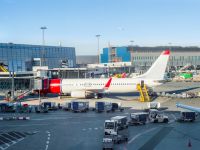Britain and much of Western Europe were gripped by growing protests over high fuel costs yesterday, as oil prices stuck stubbornly near their 10-year peak and European Union (EU) ministers agreed to discuss fuel taxes.
In Britain, where protests have snowballed over the past five days, Labour Prime Minister Tony Blair yesterday evening called on oil companies to break blockades set up by protesters outside refineries and oil depots and promised that oil tankers would be given full police protection.
The situation at petrol stations, thousands of which have run dry because of protests and resulting panic-buying by motorists, will start returning to normal within 24 hours, he promised.
President Bill Clinton said yesterday that Washington was closely monitoring crude oil prices and may take unspecified action if prices remain near record levels for the US winter season.
"We are working very hard on oil reserves," he told reporters at the White House.
"We are watching very closely to see what the markets will do. We will examine other options if we face another tough winter."
Analysts said that among options Clinton may be considering is opening up the nation's strategic petroleum reserves to satisfy demand for oil and bring prices down.-
Blair also held out the possibility of tougher action if the situation did not fast improve, saying his government had adopted emergency measures which "allow us to make sure that supplies can get through and we are confident that we will be able to maintain that."
"I believe that whatever the rights or wrongs of the argument over fuel duty we cannot accept as a government or as a nation that policy should be dictated by illegal blockades, pickets or direct action," he told a news conference.
"Legitimate protest is one thing. Trying to bring the country to a halt is quite another - and there can be absolutely no justification for it," he added. And he again refused to cave in to demands for cuts in fuel levies, saying his government could not "possibly, responsibly" introduce an emergency budget to alter taxes on fuel.
More than half of Britain's 13,000 petrol stations have run dry, and many others are down to their last reserves as protesters continue to picket oil refineries and depots.
Protesters elsewhere in Europe, following on last week's French example, also took to the streets. Truckers in Brussels choked off key roads around the European institutions near the city centre and, elsewhere, blocked fuel depots and major roads.
In Holland, truckers and taxi-drivers blocked traffic on several motorways for a few hours to protest high prices. And unions representing hauliers called for a mass demonstration on Saturday in The Hague to back demands for cuts in fuel taxes.
In Germany, drivers of some 100 trucks, 25 buses and 50 taxis demonstrated at the state parliament building in Saarbruecken, in the west of the country, while truckers assembled on a highway in Bavaria, in the south. In Poland, truck companies are to meet today to discuss whether to start blockading oil refineries.
Even in France, where a protest that gripped the country last week set the model for the growing European campaign, small-scale protests flared, showing that tax concessions may not have eased the crisis.
The wave of protests was set off by sharp increase in crude oil prices. In March, a barrel of crude was trading at $22.By yesterday, it was hovering near a 10-year high, despite a decision by oil-producing countries to raise production by 800,000 barrels a day from October 1 to cool the market.
Oil prices in London eased marginally to $32.65 a barrel at 16:00 GMT, down from $33.62 at the start of trading.
The French government, which holds the European Union presidency, has called a meeting of EU transport ministers for September 21 to discuss fuel taxes, Belgian Transport Minister Isabelle Durant said yesterday. –AFP
©--Agenece France Presse.
© 2000 Mena Report (www.menareport.com)







